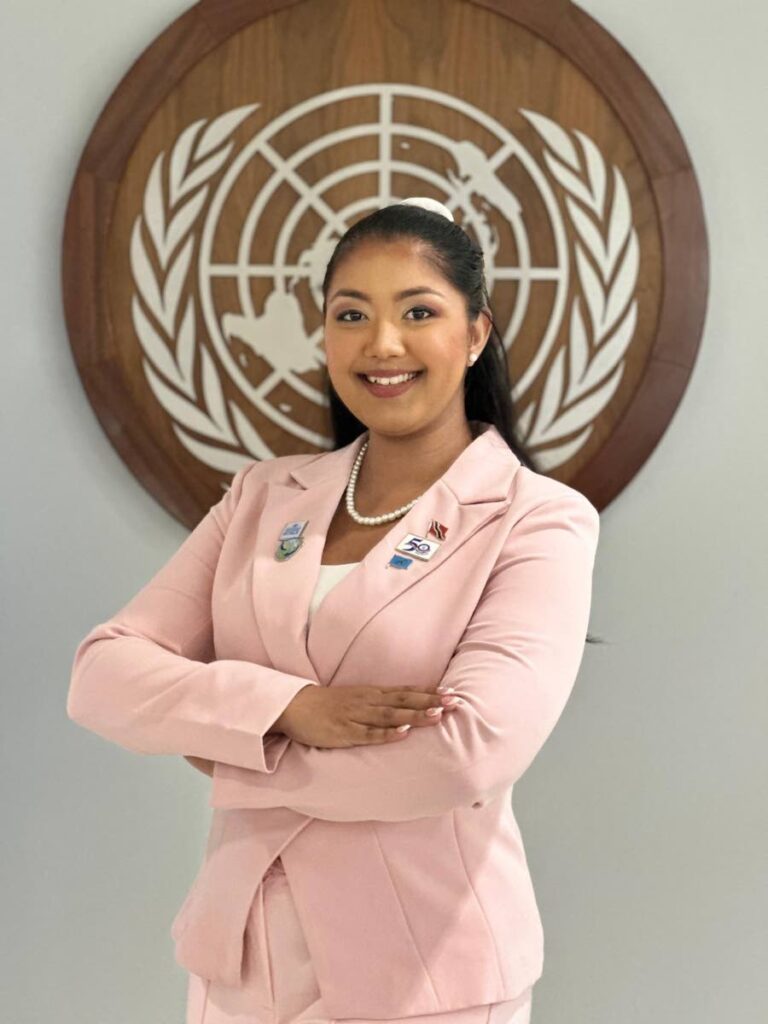Rhythms of peace

SAMANTHA RAMPERSAD
THE INTERNATIONAL Day of Peace, also known as World Peace Day, is a UN-sanctioned observance held annually on September 21. This year celebrates the 25th anniversary of the United Nations General Assembly’s adoption of the Declaration and Programme of Action on a Culture of Peace. In recognition of this significant milestone, the theme for 2024 is “Cultivating a Culture of Peace,” focusing on fostering global harmony, mutual understanding, and sustainable conflict resolution through the promotion of peaceful values.
Amid rising geopolitical conflicts and lingering tension, cultivating a culture of peace – particularly in the minds of children, youth and community – is imperative, through means such as art, culture and sport. In Trinidad and Tobago, a culturally rich Caribbean country with its well-known Carnival and other cultural activities, young people are actively engaged in fostering a spirit of peace within the nation.
When people are asked, "What does peace mean to you?" the answers often vary, ranging from living a life free of debt or enjoying a beach vacation to experiencing tranquillity or simply a state of no war. While the meaning of peace differs from person to person, a shared perspective is that without peace our lives are marked by conflict, violence and instability.
The rich and diverse culture of TT is a source of national pride, uniting its citizens. This spirit of unity is evident in the country's vibrant festivals such as Carnival, as well as in its sport and music.
However, the rising rates of crime and violence in sweet TT and across the Caribbean highlight the urgent need to cultivate a culture of peace. Perhaps it is time for us to harness our rich culture and embrace the energy of our youth to harness and inspire innovative and creative approaches to fostering peaceful communities.
Historically, Carnival has symbolised freedom and resistance against oppression. Today, it has evolved into a celebration that unites people of all backgrounds, where everyone can "palance" and "dingolay" while showcasing our vibrant culture.
Carnival production artist Sudesh Ramsaran explains that Carnival fosters peace by highlighting cultural expression: “My work is deeply rooted in our identity, fostering a greater understanding and respect for our culture as we share it with the world.”
Kiddies Carnival, in particular, is an artistic celebration that plays a vital role in shaping the experience of our culture to youth. Terrence La Caille, Kiddies Carnival bandleader for La Ta Caille Kidz, views Kiddies Carnival as a platform where art and culture serve to unify and inspire peace.
He believes that, through the eyes of children, Carnival reveals its true essence. Their natural ability to bring smiles to people's faces creates a shared sense of joy and unity. As La Caille notes, "the true magic of Carnival lies in its ability to bring people together in celebration of our culture, with children's smiles leading the way."
Sport contributes to youth empowerment and promotes shared values such as fair play, teamwork and collaboration, which are key for a peaceful coexistence. UNESCO (United Nations Educational, Scientific and Cultural Organization), as a UN agency with a mandate on sport, recognises the value of sport as a driver of social inclusion, health, sustainable development and peace.
Cricket, especially the West Indies team, unites supporters from diverse backgrounds across the Caribbean, fostering regional pride and collective identity with a sense of belonging, inclusion and unity. Programmess like the Community Football Initiative, organised by the TT Football Association (TTFA), provide a constructive platform for youth, teaching teamwork, discipline and mutual respect, and contributing to grassroots peacebuilding.
“To the youths out there, please find your passion and follow your dreams. Drugs and guns (are) not the way forward,” said cricketer Dwayne Bravo, who uses both sport and music in his advocacy. His song Sad Place addresses the challenges young people face, promoting a message of peace.
Youth today may feel that peace is a distant dream, or a concept confined to virtual worlds, but it can become a reality if they embrace the call for change. As the advocates and architects of the future, young people have the power to shape the world of tomorrow through the choices they make today.
With the potential to create either a sustainable future or a bleak one, youth must unite for the common good by promoting and cultivating a culture of peace, which can be achieved through sport and cultural activities.
Young people have the unique capacity to understand the needs of their communities and be agents of positive change despite challenging circumstances. Indeed, youth are essential actors in contributing to peacebuilding, as recognised by UN Security Council Resolution 2250.
Change doesn't have to be drastic; in fact, the most impactful transformations often start with small, meaningful actions. Young people can channel creativity into innovation, using their platforms to promote messages of mutual understanding, inclusion, and productivity.
By actively engaging in grassroot projects – whether organising local events, sport competitions, even clean-ups – they set the tone for collaborative solutions and can lead the way in fostering unity and peace, proving that progress is not just possible, it's inevitable with the right mindset and commitment.
Samantha Rampersad is the vice president of the Trinidad Youth Council and Young Peacebuilder for Latin America and the Caribbean at the United Nations Alliance of Civilizations, in collaboration with the UNESCO Office for the Caribbean

Comments
"Rhythms of peace"